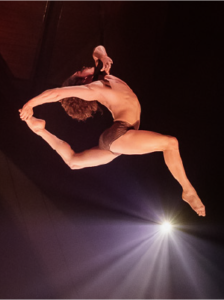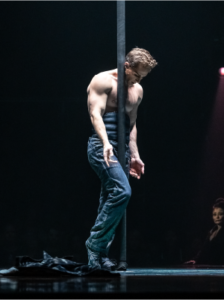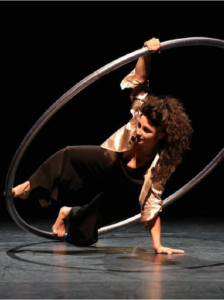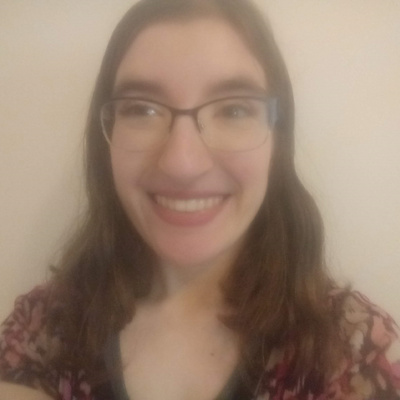“Last Impacts”: After Cirque de Demain Festival’s Cancellation, 3 Artists Move On
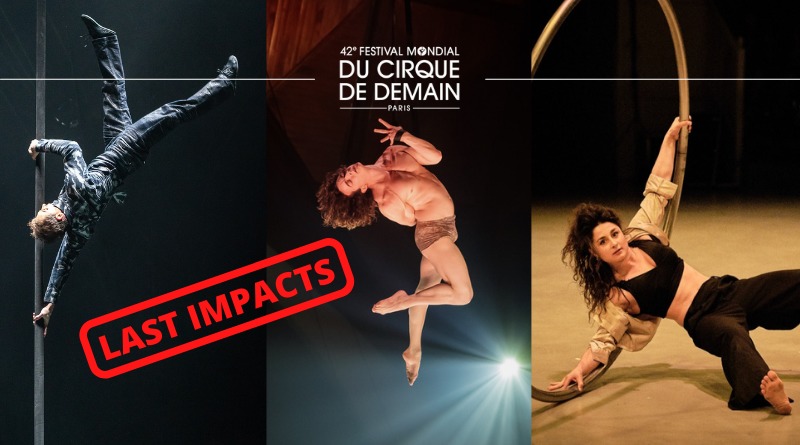
After this year’s edition of Le Festival Mondial de Cirque de Demain was canceled, festival planners and artists alike were left to face the disappointment of their loss– but in the face of loss, there grew determination. Three circus artists on the festival’s roster– Agustín Rodriguez Beltran (RB), Marica Marinoni, and Evgeny Kurkin— weigh in on moving on and recovering from disappointment.
In its third year, the COVID-19 pandemic continues to throw wrenches in our plans. The world seemed almost back to normal when, after a year of postponement, the 42nd edition of the Cirque de Demain festival was finally set to happen from January 27-30, 2022 in Paris, France. But history repeats itself even in the present. In early January, as the Omicron variant made waves and sent worldwide case numbers soaring again, French health officials moved rapidly to introduce a new round of restrictions on public gatherings.
Left with a difficult choice, the organizers of the Cirque de Demain festival, under Chairman Alain M. Pacherie, held an emergency meeting to decide whether to proceed with the event. They knew there really was no choice; the health and safety of their artists and audience mattered more than having the event itself. Finally, on January 5, it was announced that the festival would be postponed once more until 2023.
It was the right call— but, as we’ve been reminded in the last three years, the necessity of a choice doesn’t make the outcome any easier to swallow. This was especially the case for the artists slated to perform at the 42nd Cirque de Demain festival. After facing the same disappointment two years in a row, these artists would be more than justified if they sank to their knees, shook their fists at the sky, and shouted abstract things about Fate’s cruelty. Yet, as you’ll soon read, they seem more than ready to keep moving forward on their circus journeys. Let’s introduce the cast of the rest of this piece:

A little after news broke of the cancellation, we at CircusTalk reached out to these Cirque de Demain artists to ask how they were processing the situation. Their responses were as varied and interesting as their acts themselves, and offer a good reflection on responding to disappointment— creatively, and as people.
Carolyn Klein (CK): Tell us about your first reaction when you heard that the festival was cancelled.
Agustin RB (ARB): It really broke my heart–- we were so close. I’ve waited almost two years to perform my act properly with all its elements before an audience.I’d planned out the two months around the festival to make sure I was in a good headspace going into it and didn’t want to book too much for afterward. It was to be a sort of “rite of passage” for me.
So when I heard the news, it felt like I was in limbo. I needed time to let my emotions settle and find the ground again. I’m on it now.
Marica Marinoni (MM): Unexpected; it wasn’t easy to handle emotionally. I had been waiting two years for the festival. The worst part was, on the afternoon of January 5, before the cancellation was officially announced, I’d started getting messages from friends showing me a picture of the Facebook post. “This can’t be happening again,” I thought.
That evening came the email that confirmed the news and, well… the more times I read it, the more it felt like when you get locked out of your house at two a.m. And it starts raining.
Evgeny Kurkin (EK): It was pretty devastating. I was really excited about the festival. These past few years were really hard for me, so the festival represented a certain hope for the future— an opportunity to get inspired and meet some great performers. So it was really hard to read that it was canceled.
CK: What act did you have planned for the festival? How did you come up with it?
ABR: This act is actually my final exam from the National Circus School: a contemporary straps solo over a reflective surface that speaks of witnessing or understanding oneself by alluding to classical mythology. We were supposed to present them in March 2020, and, well— you know the story.
There’s something strangely prophetic about creation: more often than not, what you create ends up reflecting what you’re living. For the exam, my act was my transition from a student into a professional, so I wanted to make it a presentation of myself to the world. I wanted to create something based on my nature: a timeless story I would never tire of telling. Therefore, I began to take note of the things I gravitated towards. I made a collage of things that inspire me, make me feel at peace, and put me in that mindset that brings me back to myself— creating “my own myth.” I was studying comparative mythology when I came across a “character” for myself: a beautiful, angelic creature— one taken almost from a Renaissance painting.
Funnily enough, before the piece was even ready, I started getting comments asking if it was about the myth of Narcissus. I’d say so… but that, instead of him falling in love with himself, it was about him trying to understand himself.
MM: The number I had prepared was based on movement research I’d done on the Cyr wheel while at CNAC. Accompanied by my musician, I would spend those eight minutes exploring everything I could do with the wheel that was not rotation. I create an atypical relationship to my tool based on concepts of conflict and the ways I inhabit my femininity.
For the festival, I had worked on some variations of the act, adding some technical innovations to the wheel that I had not yet had the opportunity to bring to the stage. It was to be a version 2.0, in short…
EK: I was going to do a Chinese Pole act. The act was my reflection on three years of depression that I went through… which now, I realize more and more, may be an important topic in our current reality.
CK: Where do you draw inspiration from as an artist?
ABR: Everywhere; experiencing life. Inspiration usually comes to me in the calmer moments, when I can absorb all that’s happening. As an overthinker, I like to find simplicity in things.
However, I’m also irreverently curious, and that takes me on unexpected adventures. I say that I fall in love too easily. I love to daydream about projects, people, ideas… I have a very big heart.
MM: I’ve always thought that the important things in life— like birth, death, love— were not “beautiful” things, but rather “violent” ones. I live inside the feeling that the simple fact of existing is something violent, and this is what leads me to have something to say on stage.For me, going on stage is like entering a battlefield where everyone has to come to deal with the violence of their daily lives. I am inspired by Greek tragedies, the Colosseum, and the work of Marina Abramovich.
In a world that is increasingly digitised, immaterial, and lacking in physical contact, I find it that it’s something extremely generous and powerful to put our bodies into play in a performative act.
EK: I think, mostly experiences. Either my own or other people’s. I think experience is what shapes people and makes them create. Looking at them through their work, my fellow artists always inspire me.

CK: How will you channel your disappointment about the festival into your creative work?
ABR: I’m kind of happy to have free time and get nourished from having proper time to read, to journal, and to pursue activities that I would normally not have the time for. That’s the silver lining of this whole situation. It is definitely okay to feel lost— bit by bit, life will find its structure again.
For the past year, I’ve wanted to reconnect with my creative voice in something new. That’s my plan for those moments I spend training and alone. I want to observe, again, where I am now, how I’m thinking, what I’m gravitating towards, while at the same time trying to switch up my creative approach. Without forcing any one aspect or the other, I want to remember the fun of it, keeping a notion of play.
MM: I don’t think of myself as someone who needs to be in a certain context to keep wanting to move forward. I create my own context. I channel my energy into pushing my personal boundaries.
I also believe that circus, in this moment, does not need more suffering or disappointment.We should focus on the things that make us feel good and creative. As far as I’m concerned, there are two things I like: the Cyr wheel and lasagna. I’m better at wheeling than making lasagna, but lasagna is better for eating.
EK: I don’t think I want to do that. I would like it to stay a disappointment, but I will put it behind me and move on.

CK: What are you most excited about right now (or for the rest of the year)?
ABR: I work withContemporary Synchro Art,an underwater dance company; we’re currently working on a research grant to develop a training methodology and a dance piece with five interpreters that combines contemporary dance with synchronized swimming principles to create aquatic aesthetics. Because of the festival, I wasn’t planning to be available for the last stage of this project— but finally, it turns out I am, so I’m excited to finish and actually film the piece. We’ve been working on it for the past year and a half!
In general, I’m hoping for the cancellation to be one of the last big impacts of the pandemic. I really want to think it is… I can’t wait to start touring in a circus, instead of juggling four jobs while trying to be a full-time physical artist.
MM: The premier of “Lontano”, my Cyr wheel solo, on March 18 at the festival Spring. This show will be my first creation as an author, creating and directing it together with one of my CNAC teachers, Juan Ignacio Tula, and I am very excited about it.
Since last year, I’ve been putting all my physical and creative energies into the realisation of this show. I view creating it as a cry for resistance; my only way to counteract everything that’s going on is to keep working hard, to stand up and protect the essentiality of our work.
EK: I’m probably most excited to see what other opportunities will come my way, and also excited to put more energy into my photography.

CK: Will you be able to attend the 2023 festival?
ABR: Yes, of course!I’m looking forward to going to Europe for the first time and meeting all the people I’ve been interacting with online, making new friends from the worldwide industry— not to mention performing my piece in the best conditions for people to see it in. I see performance as a kind of offering, so the thought of doing it in such a prestigious place really touches my heart.
MM: Probably, yes. Doing the festival is very important to me. But that period is uncertain; I still have to figure out if my schedule (and COVID) will allow me to.
EK: I will do my best to make it to the festival next year. I’m still super excited to experience it.
Images shared by Evgeny, Marica, and Agustin. Respective photos credited to Evgeny Kurkin, and Ray Argaza and Caro Thibault (for Agustin's). Thank you to Emily Holt for the graphic design work.
Editor's Note: At StageLync, an international platform for the performing arts, we celebrate the diversity of our writers' backgrounds. We recognize and support their choice to use either American or British English in their articles, respecting their individual preferences and origins. This policy allows us to embrace a wide range of linguistic expressions, enriching our content and reflecting the global nature of our community.
🎧 Join us on the StageLync Podcast for inspiring stories from the world of performing arts! Tune in to hear from the creative minds who bring magic to life, both onstage and behind the scenes. 🎙️ 👉 Listen now!
